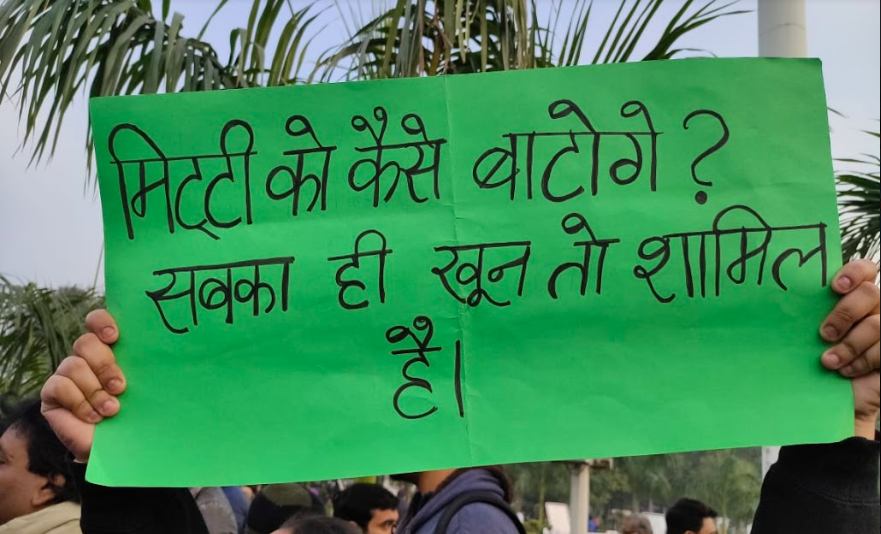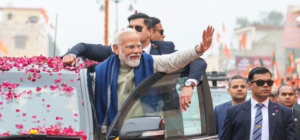Based on articles by Prabir Purkayastha, Sushovan Sircar and Yogesh S.
On December 22, PM Narendra Modi, addressing the Bharatiya Janata Party (BJP) election rally in Delhi, stated that there has been no discussion around the word NRC ever since the formation of his government in 2014. As per records, this again isn’t true. “We did not make it, it hasn’t been tabled in Parliament, it hasn’t been discussed in the Cabinet, no laws have been formed. Would we come up with a communal and divisive law when we have rolled out development projects which do not ask for the religious identities of the beneficiaries?” he asked, feigning innocence.
After a Cabinet Meeting on December 24, Prakash Javadekar stated in a Press Conference that the National Population Register (NPR) is only a population register and not a citizens’ register, and that the NPR has nothing to do with NRC.
Modi and Javdekar are lying. According to the revisions made in the Citizenship Act in 2003, the NRC process begins with the compilation of the National Population Register (NPR). The NPR is, indeed, the first stage of the NRC. This has been admitted in Parliament by Kiren Rijju when he was Minister of State for Home Affairs. Replying to B.K. Hariprasad in Rajya Sabha on 23 July 2014, he said, “The government has now decided to create the National Register of Indian Citizens (NRIC) based on the information collected under the scheme of NPR by verifying the citizenship status of all individuals in the country.” He again reiterated this in Rajya Sabha in response to a question by Dr T.N. Seema on 26 November 2014: “The NPR is the first step towards creation of National Register of Indian Citizens (NRIC) by verifying the citizenship status of every usual residents.” This point is also clearly stated in a 21 April 2015: A press release by Ministry of Home Affairs on 21 April 2015: “It has been decided that National Population Register (NPR) should be completed and taken to its logical conclusion, which is the creation of National Register of Indian Citizen (NRIC) and National Identity Cards would be issued to citizens by verification of citizenship status of every usual resident in the NPR. The proposals for the same are under consideration of the Government.”
The first step in the NRC process has already been taken by issuing the notification on NPR. The Cabinet decision on the NPR on 24th December is only to sanction the money—Rs 8,500 crore for the NPR.
The Gazette notification to prepare and update the NPR was issued by the Registrar General of Citizen Registration on July 31, 2019. The Census organisation has already stated on its website that house to house enumeration will be conducted throughout the country (except in Assam) for “collection of information relating to all persons who are usually residing within the jurisdiction of the Local Registrar”. This enumeration will be undertaken between the first day of April 2020 and September 30, 2020.
According to Javadekar, the NPR is a part of the Census. The Census authorities undertake both the Census enumeration and the NPR. The NPR is being updated along with the Census enumeration for 2021. They are, nevertheless, two separate things.
It is obvious from the Rules framed by the Home Ministry in 2003 that the NPR is directly linked to the NRC. Section 3 of the Notification on 10th December 2003 called The Citizenship (Registration of Citizens and Issue of National Identity Cards) Rules, 2003 details the National Register of Indian Citizens. It states, in Clause (5):
“The Local Register of Indian citizens shall contain details of persons after due verification made from the Population Register.”
It also states in Section 4, Clause (3):
“For the purposes of preparation and inclusion in the Local Register of Indian Citizens, the particulars collected of every family and individual in the Population Register shall be verified and scrutinized by the Local Registrar, who may be assisted by one or more persons as specified by the Registrar General of Citizen Registration.”
In other words, the Local Population Register is incorporated into the NRC. It gets its data from the Population Register. These Rules make it clear that the NPR is indeed the first step towards the NRC. The house-to-house enumeration for the National Population Register is indeed the first step towards NRC.
Residents will be asked 15 questions in the NPR survey. These include questions on the place of birth, the date of birth, and the name of the father and mother and the details of Aadhaar. This information will then be crosschecked with the Unique Identification Authority of India (UIDAI) to verify the individual’s biometrics.
The Rules quoted above also have a clause to identify doubtful citizenship from the Population Register. This is in Section 3, Clause 4:
“During the verification process, particulars of such individuals, whose Citizenship is doubtful, shall be entered by the Local Registrar with appropriate remark in the Population Register for further enquiry and in case of doubtful Citizenship, the individual or the family shall be informed in a specified proforma immediately after the verification process is over.”
The only question in the Rules related to citizenship is one on the nationality of the resident. No other question or proof of citizenship is asked in the NPR enumeration. But though no documents regarding citizenship will be asked during the enumeration and the verification process, particulars of such individuals whose citizenship is deemed to be “doubtful” will be entered by the local Registrar with appropriate remarks in the Population Register for further enquiry. The Rules do not say on what basis “doubtful” citizenship can be deduced during a process of enumeration that has no provision to examine any document related to a resident’s citizenship.
As Prakash Karat has pointed out, “It is at the verification stage that communal profiling will take place, in line with what the Home Minister had declared—the purpose of the NRC is to eliminate ‘infiltrators’ as against the Hindu refugees who will become eligible for citizenship under the CAA. Those summoned as ‘doubtful citizens’ will have to go through the tortuous process of submitting proof of their citizenship.”
Former Supreme Court Judge Madan Lokur has said the proviso to the definition of illegal immigrant in the amended citizenship act is unconstitutional. There is a twin requirement of a rational and a reasonable nexus to pass the test of Article 14 in defining who is an illegal immigrant. According Justice Lokur, the amended act does not pass the test that all persons have to be treated equally before law.
The “doubtful citizens” in the NPR–NRC to the illegal immigrant in the CAA 2019, is a quick hop, skip and jump. The three are tied together with an umbilical chord. We already know of detention camps and 19 lakh citizens who have been left out of the NRC in Assam. How many are going to be excluded from an all India Register?




